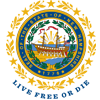News Release
Contact
30 Mental Health Clinicians Experience Firefighter Training to Help Them Better Treat First Responders
VIDEO/PHOTOS AVAILABLE HERE: https://photos.app.goo.gl/1AzP1QadmK6xt7wL8
(Please credit: New Hampshire Department of Safety)
CONCORD, New Hampshire – More than two dozen mental health clinicians in New Hampshire now have a better understanding of the grit and exhaustion held within the first responders they seek to treat.
This afternoon, 30 clinicians successfully completed “Treating Fire Service Members in Behavioral Heath Settings,” a first of its kind two-day, in-person training program that was designed to provide mental health experts with cultural competence in emergency services and assist them with offering effective care and treatment to first responders.
The course - which included both traditional classroom instruction and hands-on live, simulated fireground operations (FIRE OPS 101) - was hosted at the New Hampshire Fire Academy and delivered by the International Association of Fire Fighters (IAFF), in partnership with the New Hampshire Department of Safety’s Division of Fire Standards and Training & Emergency Medical Services. The classroom portion was delivered by a licensed mental health clinician and a professional firefighter with seasoned behavioral health experience. The fireground training portion, during which students wore required personal protective equipment and participated in four different fire and rescue scenarios, was delivered by Fire Academy instructors and staff.
The training aimed to provide clinicians with:
- An understanding of common behavioral health challenges in the fire service and barriers to help
- Identifying foundational principles for treating fire service members
- Building a successful therapeutic alliance with a fire service client
- Applying best practices to achieve positive treatment outcomes with a fire service client
- Establishing effective connections with local fire departments or unions
- Gaining direct exposure to fire and rescue operations through live fireground training
The training program was offered to licensed mental health clinicians working in private practice, behavioral health treatment programs, employee assistance programs, or those interested in collaboration with fire department peer support teams.
“This gave them some experience seeing what it’s like to rescue somebody, what it’s like to manage somebody having a medical emergency, to build that cultural competence and add to the level of training and professionalism that they already have,” said Division of Fire Standards and Training & Emergency Medical Services Director Justin Cutting.
“Being a clinician that has worked with this population for the last 5 years, we had to do a lot of our own legwork to get culturally competent, like showing up at the department,” said Candace Alizio, Executive Clinical Director of Forge Veteran and First Responder Healthcare’s Manchester location. “This is beyond words. This is going to help us help so many more people.”
“The loud popping, the glass shattering, the doors popping – the weight of it – those tools are about 50 to 60 lbs. each, and I had no idea,” said Emily Barton, a licensed professional counselor at Sunrise Counseling in Concord. “Parents might be in the background, other loves ones might be in the background, everyone is screaming and crying - so, just to have some understanding and gain a little bit more perspective into what that experience is like really helps us understand as clinicians.”
“We get into this career because we’re tough. Unfortunately, that can be to a detriment down the line,” said Brian Ryll, president of the Professional Fire Fighters of New Hampshire. “So, to put together a program like this, to allow clinicians to really relate to firefighters and understand what firefighters go through on a daily basis helps to break down those barriers.”
Scott Robertson, a Behavioral Health Specialist with the International Association of Fire Fighters (IAFF), helped co-create the program following his experience battling The Station nightclub fire in Rhode Island in 2003, which claimed the lives of 100 people.
Robertson said he sought treatment from a clinician years later, but the clinician became overwhelmed with emotions from the details he shared and was unable to help him.
“I need somebody that I can talk to, and the IAFF has done an amazing job training peers in the fire service,” said Robertson. “We’ve trained 8,400 peers – firefighters - to connect firefighters that are having difficult times with clinicians that are culturally competent. The next step in that is training the clinicians in our culture, and that’s what we are doing here today.”
“Quite honestly, I don’t think there’s anything more important than what’s taking place today,” said Department of Safety Commissioner Robert Quinn. “And not only will it build the cultural competency, but I think what it will also do is start conversations between those in the fire service and those that are here to help, so that we can all have a better understanding of what they do day in and day out, and the experiences that they see – the unthinkable that most will never, ever have to go through.”
Of the 30 clinicians that participated in the class, more than 25 of them currently treat emergency responders in New Hampshire.



